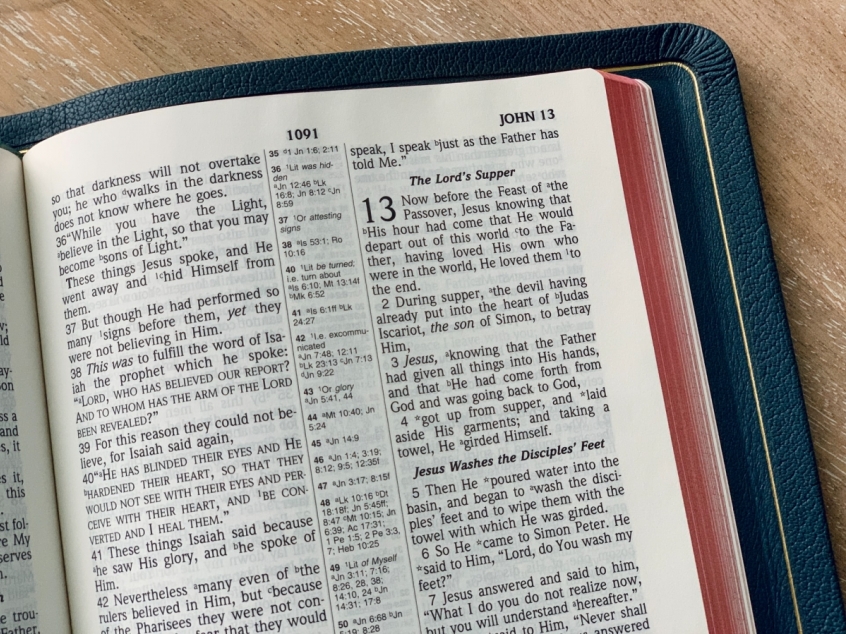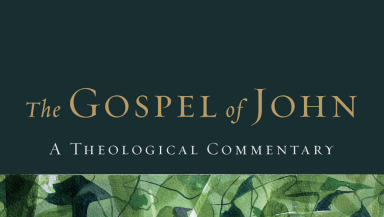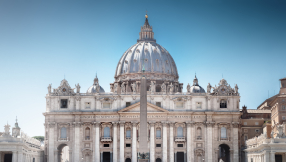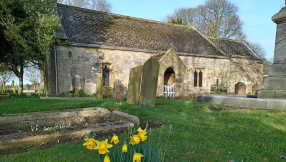
Theologian David F Ford speaks to Christian Today about his new commentary on the Gospel of John, published by SPCK, and what makes this particular Gospel so special.
CT: You have spent the last 20 years researching your commentary. What new insights have you gained in that time?
David: It has been an extraordinarily rich time, with so many fresh insights, far too many to name now. But I'll just talk about four very different insights.
One is how John can at the same time be the most accessible Gospel for beginners - its Greek is very straightforward - and also the most challenging to more experienced Christians. It can grip you immediately, but the more you re-read it, the more you can find. John wants readers to meet and trust Jesus but also to continue with him, and to mature in their following of Jesus. Somehow, he manages to combine the two.
Another is the importance of the first words Jesus says to his first disciples in 1:38: 'What are you looking for?'. It is key for all of us who are his disciples. It is a question about desire. What do you really, really want? The whole Gospel can be read as an education of desire - watch how words such as seek, search, wish, want, will, hunger, thirst, ask, and more, run right through the Gospel. And Jesus himself is about what is most to be desired - abundant, vibrant life (a wedding celebration with the best wine!), trust, joy and, above all, love. But the culmination of our desire is not for a 'what' but a 'who'.
There is that most moving meeting between the crucified and resurrected Jesus and Mary Magdalene in John 20. She is weeping, looking for his dead body. But he is alive and asks her, 'Whom are you looking for?'. She was looking for a dead 'what' and found a living 'who'.

A third insight, that grew and grew during the twenty years, is how deeply relevant John is to our 21st century world. In the commentary I try to bring this out all the way through, chapter after chapter.
At the heart of it, of course, is the living Jesus Christ who is 'the way, the truth and the life' for today as much as for any previous period. He is the full self-expression and self-giving of God to us, and embodies the deep meaning and deep love that we all need.
But there is so much more embraced in that, such as the importance of doing 'signs' of abundant life and love for all people, not just those in our own community - Jesus provided that large amount of good wine to all the guests at the Cana wedding, he fed all the 5,000, he healed the sick freely.
I have just watched a moving TV report from a train station in Berlin where German families were lining up to welcome Ukrainians fleeing the war, complete strangers, into their homes. They were holding up signs such as 'Family with children welcome, up to six - short or long term.' What a sign!
There is also in John a realism about sin and evil: 'the light shines in the darkness, and the darkness has not overcome it' - but the darkness still continues, and, if we are sent as Jesus was sent, then we too are sent into darkness (darkness in ourselves, in the Church, and in the world), and into tough, messy situations, where we cannot avoid suffering. And in the context of the pandemic as well as war, how crucial it is to trust that death is not the worst thing that can happen to us, and that Jesus is with us on both sides of death!
But probably the biggest, most important insight I had was into the importance of the prayer of Jesus in John 17. I can hardly begin to say how much that prayer means to me now. It was one of the most challenging parts of the commentary to write, trying to do justice to its depths. It is the fullest expression of the desire of Jesus himself, and of what he is inviting us into: unity in love with him and his Father, and with each other, for the sake of the world God loves. And a further insight into this, in our time of environmental crisis, has been that, if the one we are united with is the one 'through whom all things were made', then this must include the care of creation.
CT: Has anything in your research surprised you?
David: Not a single chapter was without its surprises. And the surprises have kept on coming. Jesus himself is the great surprise. And he breathes his Spirit into us so that we too can carry on springing good surprises. Above all, surprises in how we love and serve, and in the signs of abundant life we can be inspired to do. But also surprises in the meaning and truth we discover - the Spirit is given to lead us into all the truth.
For me, the basic thing I did was to re-read and re-read and re-read the Gospel slowly, by myself and with a great many others over the years, and also paying attention to commentaries and to other ways the meaning of John has been expressed - including hymns, songs, liturgies, music, art, poetry, sermons, films, and above all in the lives of people and communities.
The sheer abundance of meaning never ceased to amaze me, and I slowly took in how fundamental this is in John. He headlines it in the Prologue: 'From his fullness we have all received, grace upon grace.' Then there is one image of abundance after another - hundreds of gallons of wine, the wind of the Spirit blowing freely, water gushing up to eternal life, food for 5,000, light for the whole world, a whole house filled with fragrance, a large catch of fish, books the world could not contain, and more.
So I think one ongoing surprise is the continual fruitfulness of John, always overflowing with life-shaping meaning.
And it is still happening as I go on re-reading, by myself and with others. One of the many ways John has to communicate his message is by connecting with other parts of scripture - one thing that I did not anticipate was that reading John would lead me into such wonderful conversations with the other Gospels, with the letters of Paul, and above all with the Old Testament through the Greek translation of the Hebrew scriptures, the Septuagint, in which John was steeped.
I try in the commentary to give a sense of the richness that this two-way illumination between John and the rest of scripture opens up. It makes me sad when some responses are to try to wrap up the meaning in neat packages - John wants his readers to have a mature faith that grows all the time in understanding, prayer, and loving service.
CT: What is it about John's Gospel that still excites you after all these years?
David: Jesus and his Spirit above all!
At the heart of this, I think, is the exciting combination of depth and daring in the Christian life that John encourages. The core double thrust of the Gospel is to go deeper and deeper into who Jesus is and what he does and says, and at the same time deeper and deeper in love and service into Christian community and, from there and with others, into the world God loves.
The pivotal moment is in John 20 when the resurrected Jesus appears to the frightened disciples, bringing his peace. Then he sends them - 'as the Father has sent me, so I send you' - and breathes the Holy Spirit into them. The Spirit continually leads us deeper into who Jesus is through re-reading this Gospel and the rest of scripture, and also inspires us to do and say daring new things. That 'as' means that we have to repeatedly reflect on how the Father sent Jesus, his whole story, but we then have to work out our living it in ways that are not the same but 'as' all that, in line with it, in our different situations - including new, surprising initiatives and improvisations.
The basic, amazing excitement is the presence of Jesus in the Spirit, that Jesus is present with us as God is present. The climactic theological statement is the cry of Thomas to the crucified and resurrected Jesus in Chapter 20: 'My Lord and my God!' Then Jesus says, 'Blessed are those who have not seen and yet have come to believe.'
And immediately John addresses the reader about the purpose of writing this Gospel, 'so that you may come to believe that Jesus is the Messiah, the Son of God, and that through believing you may have life in his name.'
The conclusion is clear: those of us who are not eyewitnesses can be blessed by reading this Gospel. And the double reason for this is also clear. First, because Jesus, the main character of the story, is present to us, as God is present to us, while we are reading and through our reading. Second, the original eyewitnesses did not have the advantage of the years of thinking, praying, living in the Spirit, and learning from many other witnesses and writings on Jesus that are distilled into the Gospel of John.
I find this is a reality that never stops being exciting, inspiring, and challenging - and it repeatedly leads into prayer and into action.
CT: Is there anything unique you think that John gives us that the other three Gospels don't?
David: Obviously, the others do not have anything like the Prologue or the long conversations with Nicodemus, the Samaritan woman at the well, the man born blind, with Mary and Martha, and with Peter in the final chapter. There are also teachings such as in Chapter 6 about Jesus as the bread of life, about the meaning of the crucifixion in John 12 (this was one of the most difficult yet fruitful parts for me, and it changed my understanding of the death of Jesus), and about the whole ongoing life of discipleship in the wonderfully rich Farewell Discourses with the disciples in John 13-17, with its climax in the long prayer of Jesus.
Then there are events only in John, such as the wedding at Cana, the raising of Lazarus, and Jesus washing his disciples' feet. But John also sheds new light on the gathering of disciples (and on being disciples, which simply means 'learners') by Jesus in John 1; on the importance of John the Baptist; on several of the disciples, especially Peter, the 'disciple Jesus loved', Judas, and Thomas; on the trial of Jesus; and, perhaps above all, on both the death and the resurrection of Jesus.
At the heart of the uniqueness of John is, I think, that he combines eyewitness testimony, knowing the other Gospels, and long years of reflection, prayer and living in the young Christian community. He is trying to distil the essence of the Gospel for both beginners and those who are more experienced, and there is a wonderful simplicity about what he concentrates on: who Jesus is, and what the essence of being his follower is. What Jesus is saying to us might be summed up as: I love you and I send you. Yet this simplicity is endlessly deep and rich.
CT: What difference can that unique contribution make to our own personal faith as modern readers today?
David: The difference John wants to make is long term, in fact, permanent - eternal! As modern readers, I think the main thing is to make a habit of reading it slowly, thoughtfully, and prayerfully, and to let it draw us deeper into friendship with Jesus and deeper into the Christian community and into the world we are sent into in love and service.
One of my favourite teachers of prayer from the last century, Evelyn Underhill, prays in one of her prayers: 'It is needful that You repeat to us daily the lesson of Your invisible presence.' John's Gospel teaches me that lesson daily, and brings home the reality and practical meaning of that presence. I remember thinking, as I thought about Jesus dwelling in us and us in him, and him breathing the Holy Spirit into his disciples: 'Has he stopped this breathing? Of course not! It is happening minute by minute now.'
And always his living presence goes together with the words he says, which are 'spirit and life', and which we can read whenever we like.
John also makes it clear to us how vital it is to be part of a community of faith, continual learning, and love. He does not have a romantic or perfectionist view of the community - he shows how, even among the disciples Jesus himself chose, there were many types of faith, as well as misunderstanding, cowardice, violence, denial, theft, doubt and betrayal. We too are a fallible Church, full of problems. But we do have a source of deep meaning and deep, forgiving love.
As modern readers in the Church, I sometimes think that the most important thing of all is to enter more and more into the desire of Jesus in his prayer for us in John 17. What if we really can grow into this, and let this mutual indwelling in love become more and more our reality? What if we took really seriously and wholeheartedly the passionate desire of Jesus for our unity in trust and love with fellow followers of Jesus? Would we ever think of dividing the Church over anything not in the Gospel of John? What if we took really seriously and wholeheartedly the love of God for the world and for the whole creation, which led him to send Jesus, who sends us in his Spirit? What if this prayer of Jesus could become more and more the depth and inspiration of our thought, imagination, commitment, and action?
CT: In terms of audience, what do you think John wanted readers to take away from his particular Gospel account more than anything else?
David: He is very clear about this in 20:31 and elsewhere. He wants us to come away trusting and knowing Jesus, receiving abundant life and love through him, and living this life together in love for the world God loves. All of this is within the more-than-global horizon set by the Prologue: God and all reality, all people, all life, all truth. But of course he does not want us to 'come away' from this writing at all. He has written it as Scripture, so that we are meant to indwell it and let it indwell us by constantly re-reading it, and thinking it, praying it, and living it.
CT: In terms of your own commentary, who have you written it for and how do you hope people will benefit from it?
David: In 2015 I had a crisis about who it was for. I had been working on it since 2000 - it was my new millennium project. By 2015 I had been studying it by myself and with others (including some from other religious traditions, especially Jews and Muslims) for years, teaching it to students in Cambridge University, and to people from many churches around the country, preaching it in my own parish church, and trying to pray it and live it.
Early in 2015 I gave the six Bampton Lectures in Oxford University, which meant getting up to date on the academic side, and later that year I retired from Cambridge. I sat down and read all I had so far written since 2000 for the commentary on John, and one thing became clear. What I had written fell between stools: it was trying both to engage with the academic and scholarly issues in John (with plenty of footnotes), and at the same time write something accessible to ordinary readers, especially church members and young people (I had my own three children in mind).
But I saw that it fell between stools, and I was not satisfied that it did either of those well. So I started writing again from scratch, this time having mainly church members and young people in mind. I tried out the new writing on my wife and my friend the poet Micheal O'Siadhail until they said: 'Yes, we think that works.' Then I continued trying to write like that.
What I hope this has resulted in is a commentary that most people who do any book-reading can understand (and if there are bits that are more complicated, just skip them!). Of course, there is a lot of academic work in the background, and I want to be surefooted on that, but without it dominating. There is also feeding into it a lifetime of being a Christian and a member of the Church. I see theology at its best as a form of wisdom, centred on God. In the commentary I have tried to summarise the wisdom I have learned by putting key insights into italics. Then in the Epilogue I give an account of how the commentary relates to my life and thought during the years since 2000.
How do I hope people will benefit? Above all, by going deeper into this wonderful Gospel and being blessed by that, often in surprising ways. My commentary is not the main point. As I say at the end of the Introduction, 'John's text is given in bold print. Please concentrate on that. And be open to surprises.'













